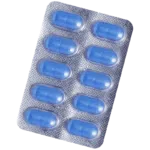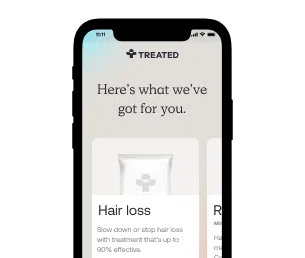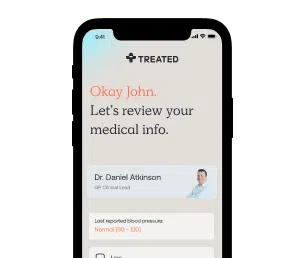Cold sores
Prescription strength lip care.
Secure delivery
UK clinicians
A cold sore is a blister on or around the lips caused by the herpes simplex virus (HSV). They start off small, grow larger over a period of a couple of days, and usually burst and scab over before healing. They’re not strictly a health risk, but they can be painful and unsightly. It’s easy to give them to someone else when you have them by kissing or sharing unwashed glasses or utensils (like cutlery). It can also be passed on from mothers to children.
Cold sores are caused by a virus that stays with you for life once you have it. Treatment doesn’t eradicate them completely, but if you use it early enough, it can stop them from developing and shorten the time it takes them to heal.
Outbreaks tend to happen when HSV, which can lie dormant for long periods, is reactivated. This can be brought on by various things like stress, being run down or an illness. It’s quite common for cold sores to spring up when your immune system isn’t at its strongest. So this might be if you’ve picked up another infection. It’s also possible to get them if you have the virus and get a lip injury (like a cut).
Herpes is often thought of as a sexually transmitted disease, but there are two types of herpes virus. Type 1 (HSV-1), which is the more common of the two, is more closely associated with cold sores. Type 2 (HSV-2) is more closely associated with genital herpes and tends to affect the groin and anal area. HSV-2 is more often passed on through sex. But either virus can be responsible for either symptom (cold sores or genital herpes).
Anyone can get a cold sore. There’s nothing that makes anyone more susceptible to infection than someone else with the virus. But if you have a weakened immune system, you’re more likely to get worse outbreaks more often.
Once you have the HSV virus, it stays with you for life and unfortunately, there isn’t a cure. But for most people, the outbreaks they get will become less severe and less frequent with age. Symptoms of cold sores will usually subside on their own after a couple of weeks, but treatment can help to speed this up.
Some people may get cold sore flare ups two or three times a year, while others could get one in their entire lives, and never have the issue again. So it’s quite dependent on the individual, and their health can be a factor in how many they get as well.
It’s common to get outbreaks if you’re stressed , or if your immune system is compromised after a bout of cold or flu. So keeping a healthy lifestyle is important to minimise flare ups.
According to the WHO, an estimated two thirds of the world's population under 50 are infected with herpes simplex virus type 1 (HSV1) , that causes cold sores. But not everyone who has the herpes virus gets symptoms, meaning they would never know they had it.
A vast majority of HSV1 infections globally are oral herpes (infections in or around the mouth, sometimes called oral-labial or oral-facial herpes), but a proportion of HSV1 infections are genital herpes.

How we source info.
When we present you with stats, data, opinion or a consensus, we’ll tell you where this came from. And we’ll only present data as clinically reliable if it’s come from a reputable source, such as a state or government-funded health body, a peer-reviewed medical journal, or a recognised analytics or data body. Read more in our editorial policy.
HSV is a lifelong virus you can get at any age. In the USA, over a third of children show evidence of HSV1 infections.
There are a few ways the herpes simplex virus can be transmitted. The most common one is through direct skin to skin contact such as kissing. Another common way it’s spread is through indirect contact with an infected person, like sharing eating or drinking utensils without washing them between uses or sharing items like lip balm. It can also be passed down from mother to baby.
You can also get cold sores through oral sex, or by sharing sex toys with someone who has genital herpes.
Cold sores usually start out as a localised tingling sensation before the blister shows up, but not everyone will get this early warning sign.
They normally pop up around the mouth and lips, but can also appear on the nose or chin. Once the infection has been ‘activated’, a small collection of fluid filled blisters will form. These can cause pain, tenderness and a burning sensation. The blisters eventually burst, and a crust forms over the affected area.
The virus is infectious just before, during and after cold sores are present. But even when the blister scabs over, you’re still infectious. HSV-1 is at its most infectious when your blisters have burst, but it stays infectious for a few days after your blisters have healed. So if you have a cold sore, it’s important to avoid kissing or sexual contact with others for a week after your symptoms have cleared up.
Cold sores by themselves don’t usually lead to any serious complications, but they can stick around for longer and be more severe in people with HIV or weakened immune systems.
Sometimes a HSV-1 infection can lead to problems like encephalitis or ocular disease, but this is mainly caused by spreading the infection from the lip to the eye (for example by touching the blister and then scratching your eye)
Because they appear on the face, it’s common for people with cold sores to feel self-conscious or anxious about them.

How we source info.
When we present you with stats, data, opinion or a consensus, we’ll tell you where this came from. And we’ll only present data as clinically reliable if it’s come from a reputable source, such as a state or government-funded health body, a peer-reviewed medical journal, or a recognised analytics or data body. Read more in our editorial policy.

How we source info.
When we present you with stats, data, opinion or a consensus, we’ll tell you where this came from. And we’ll only present data as clinically reliable if it’s come from a reputable source, such as a state or government-funded health body, a peer-reviewed medical journal, or a recognised analytics or data body. Read more in our editorial policy.
Have something specific you want to know? Search our info below, or ask our experts a question if you can’t find what you’re looking for.
Stress Hormones Epinephrine and Corticosterone Selectively Modulate Herpes Simplex Virus 1 (HSV-1) and HSV-2 Productive Infections in Adult Sympathetic, but Not Sensory, Neurons. Journal of Virology, 91(13). [Accessed 7 Aug. 2021].
Globally, an estimated two-thirds of the population under 50 are infected with herpes simplex virus type 1.
Treatment of Herpes Simplex Virus Infections in Pediatric Patients: Current Status and Future Needs. Clinical Pharmacology & Therapeutics; 88(5): 720–724.

Generic version of Valtrex. 5 day course of tablets that helps to clear symptoms.

Registered with GMC (No. 4624794)
Meet Daniel
Registered with GPhC (No. 2202465)
Meet Sanjeda
Registered with GPhC (No. 2070724)
Meet Craig
Always read the leaflet that comes with your medication and tell us about any side effects you get.
We know health, but you know you.
Our experts tell you what’s safe, but you decide what’s best.
Answer a few questions and tell us about yourself. Get tailored advice from our clinicians so you can choose better.

Choose your treatment and how often you have it delivered.

We know things change. It’s the nature of life. We’ll check in regularly to make sure your treatment is still right for you.
Pause. Change. Skip. Start again. Any time you like.
Here are some other things we can help with.
Choose from our range of tablets and solutions. Get ongoing care and support from our experts.
Stop smoking treatments that can help you kick the habit forever, and reduce your risk of disease.
Tablets or injections. Tailored weight loss treatments combined with ongoing support from our experts.
We're making healthcare more about you. Sign up to our newsletter for personalised health articles that make a difference.
Disclaimer: The information provided on this page is not a substitute for professional medical advice, diagnosis, or treatment. If you have any questions or concerns about your health, please talk to a doctor.
We couldn't find what you're looking for.
Here's everything we treat. Or, if you're looking for something we don't have yet, you can suggest something.
If there’s a particular treatment or condition you’re looking for, tell us and we’ll look into it for you.
Submit your question here, or tell us if you’ve found an issue on our site.
We’ll get back to you very soon. We aim to respond to all queries in one working day.
You’re signed up to our newsletter. Keep an eye on your inbox for our latest update.
By clicking 'Subscribe now' you're agreeing to our Privacy Policy.
We’ve sent you an email asking you to confirm your email address.